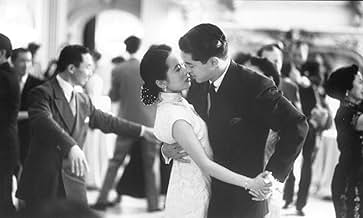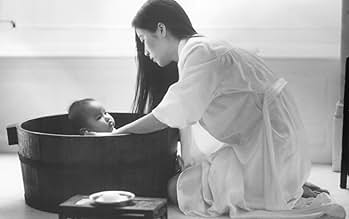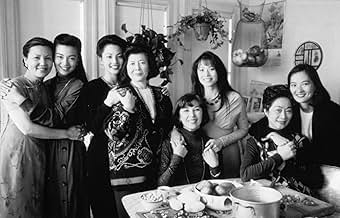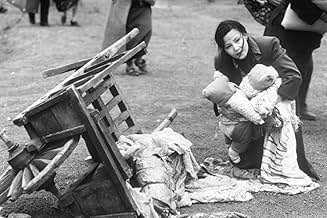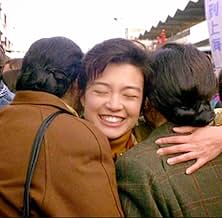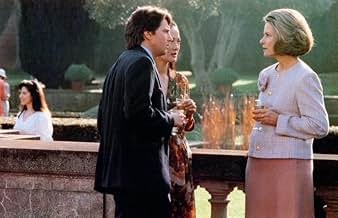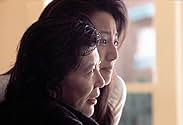VALUTAZIONE IMDb
7,7/10
19.263
LA TUA VALUTAZIONE
La vita di quattro donne asiatiche e delle loro figlie, guida e riferimento l'una per l'altra.La vita di quattro donne asiatiche e delle loro figlie, guida e riferimento l'una per l'altra.La vita di quattro donne asiatiche e delle loro figlie, guida e riferimento l'una per l'altra.
- Nominato ai 1 BAFTA Award
- 4 vittorie e 5 candidature totali
Meijuan Xi
- Lindo's Mother
- (as Mei Juan Xi)
Recensioni in evidenza
The first time I sat down to watch this it was just because there wasn't anything else on. I mean what would a single guy in his late twenties be interested in a film about relationship between Chinese-American women and their mothers? Well I was wrong. This film was very captivating and moving. It does excellent job of showing the universal issue of generational differences and the love that exist between parents and their children. All of the perfomances in this film were excellent. 8 out of 10 stars.
Every time I look back at movies through the years, I find myself wondering why The Joy Luck Club did not make a huge splash in the awards circle. The film is one of the BEST FILMS of my lifetime. It will always represent to me, the dream that is America.
I think it's because the emotions of the film are so universal, that I count it as one of my favorites. I am male, I am hispanic, I came to the United States when I was 13 years old. I felt alienated, lonely and hopeless, could anyone really understand all that I wanted to do, all that I wanted to become. How do you reconcile your cultural roots, with wanting to fit into the American Dream.
I try to watch The JOY LUCK CLUB as often as I try to read the book. Because it reminds me that we are all connected in so many ways. That our dreams and desires are not all together different. that Love reaches beyond race, beyond politics and beyond time.
when I saw this film I thought, The Academy of Arts and Sciences would gush over it. But it never reached the kind of acclaim it truly deserved. I think it's because most film makers field of personal experience limited in reaching and feeling. Most of the Academy comes from back grounds that didn't see struggle, that doesn't see the world in unison, but in carefully separated categories. This to them was not a human experience film, it was a film for a minority group. But, while The JOY LUCK CLUB is life affirming to some, to those who have lived the similarities, it is life changing.
I think it's because the emotions of the film are so universal, that I count it as one of my favorites. I am male, I am hispanic, I came to the United States when I was 13 years old. I felt alienated, lonely and hopeless, could anyone really understand all that I wanted to do, all that I wanted to become. How do you reconcile your cultural roots, with wanting to fit into the American Dream.
I try to watch The JOY LUCK CLUB as often as I try to read the book. Because it reminds me that we are all connected in so many ways. That our dreams and desires are not all together different. that Love reaches beyond race, beyond politics and beyond time.
when I saw this film I thought, The Academy of Arts and Sciences would gush over it. But it never reached the kind of acclaim it truly deserved. I think it's because most film makers field of personal experience limited in reaching and feeling. Most of the Academy comes from back grounds that didn't see struggle, that doesn't see the world in unison, but in carefully separated categories. This to them was not a human experience film, it was a film for a minority group. But, while The JOY LUCK CLUB is life affirming to some, to those who have lived the similarities, it is life changing.
If you're an Asian-American woman with parental conflicts around culture then prepare to cry at this wonderfully fabulous film. So many cultural issues come up that you never know when you'll be hit with a wave of recognition. There are many laughs here as well. You just don't know when they'll arrive. This is a definite must for anyone struggling to understand how to incorporate their ethnic heritage in the massive American melting pot.
I have read the book and seen the movie. I have also read reactions to both. Some really liked it and found it to be very real, while others hate it and object to the "stereotype." It seems to depend on whether you could relate to the stories, characters, or themes.
I myself could relate very well to the stories, but that could be because I too have experienced the intergenerational and intercultural conflict as an American-born Chinese daughter with a very traditional Chinese mother. Many other American-born Chinese women who were born in the 1960s could relate to the stories very well also. For us, we would start crying as soon as the first sentence is made.
I didn't experience everything that June, Rose, Lena, or Waverly went through, but on a grander scale, they are dealing with issues that I have struggled with as well.
I understand that there are other women who could relate to it as well, and these are not Chinese women--or even Asian women. Perhaps Amy Tan has touched on universal themes that women of other nationalities could relate to.
On the other hand, I have found that some people who are ten years younger than me didn't like the book/movie too much and found the characters "stereotypical" or "unrealistic."
Some Caucasian males didn't like this book/movie either, and again it comes back to them not being able to relate to it.
I understand another user's comment about the negative portrayal of Asian men, but this person has forgotten about June's father who was portrayed as a very likeable man who was trying to bridge the gap between his wife and his daughter. As for his objection of the daughters marrying Caucasian wives, he needs to realize that there are other issues/reasons involved and it's not because Chinese-American women like them "hate Chinese men."
In short, this movie is very good at portraying the intergenerational and/or intercultural conflict between people who are caught between two cultures. Women like me have cried while watching this movie because the issues have been very real for us. For those who could not relate to it or cannot see the "reality" of it, then this movie would not be for them.
I myself could relate very well to the stories, but that could be because I too have experienced the intergenerational and intercultural conflict as an American-born Chinese daughter with a very traditional Chinese mother. Many other American-born Chinese women who were born in the 1960s could relate to the stories very well also. For us, we would start crying as soon as the first sentence is made.
I didn't experience everything that June, Rose, Lena, or Waverly went through, but on a grander scale, they are dealing with issues that I have struggled with as well.
I understand that there are other women who could relate to it as well, and these are not Chinese women--or even Asian women. Perhaps Amy Tan has touched on universal themes that women of other nationalities could relate to.
On the other hand, I have found that some people who are ten years younger than me didn't like the book/movie too much and found the characters "stereotypical" or "unrealistic."
Some Caucasian males didn't like this book/movie either, and again it comes back to them not being able to relate to it.
I understand another user's comment about the negative portrayal of Asian men, but this person has forgotten about June's father who was portrayed as a very likeable man who was trying to bridge the gap between his wife and his daughter. As for his objection of the daughters marrying Caucasian wives, he needs to realize that there are other issues/reasons involved and it's not because Chinese-American women like them "hate Chinese men."
In short, this movie is very good at portraying the intergenerational and/or intercultural conflict between people who are caught between two cultures. Women like me have cried while watching this movie because the issues have been very real for us. For those who could not relate to it or cannot see the "reality" of it, then this movie would not be for them.
There are quite a few themes in this movie. One that springs to mind for me, right away, is that of a generation gap AND a cultural gap. This is a story about Chinese-American girls, growing up in America, raised by women who came of age in Mainland China, decades earlier. One interesting thought: most of these Chinese mothers came to America, wishing to fight like a tiger for their daughters...........wishing that they could give their daughters a much better life (and a MUCH LESS PAINFUL life) than they had. Unfortunately most of their daughters interpreted their tenacious desire to fight for them (and push them to excellence) as a lack of love: hence the "double-edged sword" of "giving their all" for their daughters.
I am all too keenly aware that this is what most people would call a "chick flick". Nevertheless, as a man, I loved it. I enjoyed how the stories of the mother's and daughter's childhoods (and their younger years in general) were interwoven throughout the movie like a Chinese tapestry or quilt. Moving in and out of the American and Chinese cultures made this even more interesting to watch. Every tale, that each Chinese mother narrated, was like a work of art: a work of art complete with flutes, violins and various types of Chinese instruments in the background. Their tales were also frequently accompanied by breathtaking views of snowcapped mountains and the wide, open Chinese countryside (so very similar to what we have seen on sheets of rice paper or on porcelain plates).
There was also a lot of powerful energy in this film. Not all of it was the negative energy of deep conflicts and emotional strife between mother and daughter. Much of it was quite positive and invigorating: the energy that filled the room of these daughters and mothers when they got together to CELEBRATE LIFE at an "extended family" party...........The very moving and touching energy, that surged forth, when mother and daughter often came together, after years and decades of conflict..........and realized that they were on each other's team..........The tears of joy that often sprang forth, when a given daughter realized, for the first time, that her mother was not disappointed in her..........and that her own happiness was PARAMOUNT, in her mother's heart.
In a small way, it did bother me that every single one of the Chinese mothers came from a dysfunctional family (and/or background). I do realize, however, that the overall story would not have been anywhere near as "riveting", had each daughter not had a mother who had to fight and claw her way to survival (and to sanity!). I will say that, of all the mothers, Tsai Chin's Lindo Jon character was perhaps the most unforgivable role model for maternity. Most of my friends, who have seen this movie, agree that she was almost HATEFUL in her attitude toward her daughter! However, this part of the movie did help make the overall plot very interesting (and deeply charged with emotion!).
A few closing comments: as a former student of Chinese History I really enjoyed seeing some of the common Chinese familial traits played out in this movie: respect for elders, honoring one's ancestors and being an obedient child. Finally, I must compliment the casting director of The Joy Luck Club: you selected some of the prettiest little girls to play the mothers and daughters in their earliest years.
I am all too keenly aware that this is what most people would call a "chick flick". Nevertheless, as a man, I loved it. I enjoyed how the stories of the mother's and daughter's childhoods (and their younger years in general) were interwoven throughout the movie like a Chinese tapestry or quilt. Moving in and out of the American and Chinese cultures made this even more interesting to watch. Every tale, that each Chinese mother narrated, was like a work of art: a work of art complete with flutes, violins and various types of Chinese instruments in the background. Their tales were also frequently accompanied by breathtaking views of snowcapped mountains and the wide, open Chinese countryside (so very similar to what we have seen on sheets of rice paper or on porcelain plates).
There was also a lot of powerful energy in this film. Not all of it was the negative energy of deep conflicts and emotional strife between mother and daughter. Much of it was quite positive and invigorating: the energy that filled the room of these daughters and mothers when they got together to CELEBRATE LIFE at an "extended family" party...........The very moving and touching energy, that surged forth, when mother and daughter often came together, after years and decades of conflict..........and realized that they were on each other's team..........The tears of joy that often sprang forth, when a given daughter realized, for the first time, that her mother was not disappointed in her..........and that her own happiness was PARAMOUNT, in her mother's heart.
In a small way, it did bother me that every single one of the Chinese mothers came from a dysfunctional family (and/or background). I do realize, however, that the overall story would not have been anywhere near as "riveting", had each daughter not had a mother who had to fight and claw her way to survival (and to sanity!). I will say that, of all the mothers, Tsai Chin's Lindo Jon character was perhaps the most unforgivable role model for maternity. Most of my friends, who have seen this movie, agree that she was almost HATEFUL in her attitude toward her daughter! However, this part of the movie did help make the overall plot very interesting (and deeply charged with emotion!).
A few closing comments: as a former student of Chinese History I really enjoyed seeing some of the common Chinese familial traits played out in this movie: respect for elders, honoring one's ancestors and being an obedient child. Finally, I must compliment the casting director of The Joy Luck Club: you selected some of the prettiest little girls to play the mothers and daughters in their earliest years.
Lo sapevi?
- QuizIn a 2018 NPR interview, executive producer Janet Yang recalled that director Wayne Wang (who she said usually had "the most lovely personality") lost his temper in a marketing meeting because the studio had presented him with the choices for posters to advertise the movie, and all of the options avoided showing the face of an Asian person. Either the designs were very abstract (for example, a decorative woodcut) or they were photos of the actresses' backs.
- BlooperIn the second chess game that Waverley plays as a child with the boy the chess board and the positions of the pieces are clearly shown on the screen. The boy moves his queen. Waverley makes a move and the boy responds with a move in which he captures a pawn and he says "check". The only possible move that the boy could have made at this point which would have resulted in an utterance of any kind would have been "checkmate" - Black queen supported by black bishop takes white pawn, Mate. After this Waverley makes another move which would have been impossible under the rules of the game because the game would have been over on black's last move.
- Colonne sonoreI Enjoy Being A Girl
Music by Richard Rodgers
Lyrics by Oscar Hammerstein II
Courtesy of Williamson Music
I più visti
Accedi per valutare e creare un elenco di titoli salvati per ottenere consigli personalizzati
- How long is The Joy Luck Club?Powered by Alexa
Dettagli
- Data di uscita
- Paese di origine
- Lingue
- Celebre anche come
- El Club de la Buena Estrella
- Luoghi delle riprese
- 610 Rhode Island Street, San Francisco, California, Stati Uniti(Harold and Lena's home interior)
- Azienda produttrice
- Vedi altri crediti dell’azienda su IMDbPro
Botteghino
- Budget
- 11.000.000 USD (previsto)
- Lordo Stati Uniti e Canada
- 32.901.136 USD
- Fine settimana di apertura Stati Uniti e Canada
- 159.009 USD
- 12 set 1993
- Lordo in tutto il mondo
- 32.901.136 USD
- Tempo di esecuzione
- 2h 19min(139 min)
- Colore
- Mix di suoni
- Proporzioni
- 1.85 : 1
Contribuisci a questa pagina
Suggerisci una modifica o aggiungi i contenuti mancanti





